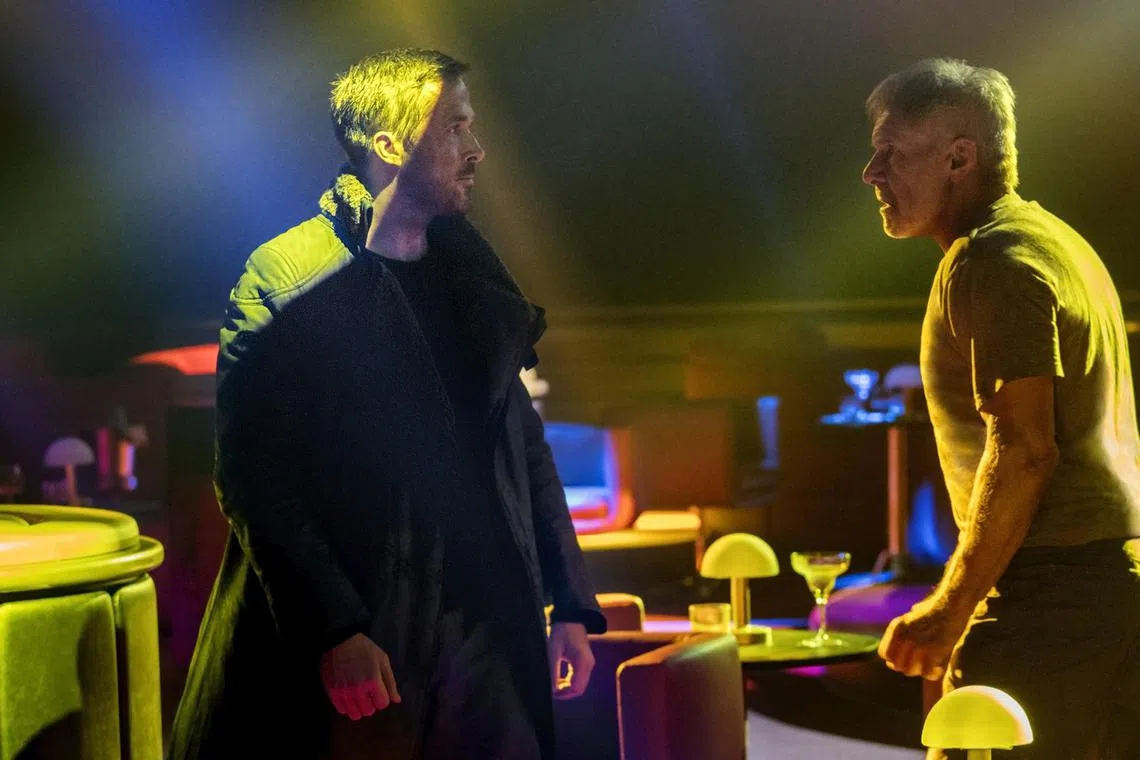Blade Runner 2049 producer sues Elon Musk over ‘robotaxi’ imagery
Sign up now: Get ST's newsletters delivered to your inbox

Blade Runner 2049, starring Ryan Gosling (left) and Harrison Ford, was financed and produced by Alcon and released by Warner Bros in 2017.
PHOTO: SONY PICTURES
LOS ANGELES – The Hollywood company behind the science-fiction film Blade Runner 2049 (2017) sued Tesla Motors chief executive Elon Musk for copyright infringement on Oct 21, accusing him of illegally using imagery from that film to promote Tesla’s new “robotaxi”.
Alcon Entertainment, a movie and television company backed by FedEx founder Frederick Smith, filed the lawsuit in a US District Court in Los Angeles.
The complaint also names Tesla and Warner Bros Discovery as defendants, saying Alcon had denied a request by Mr Musk and the companies to use imagery from Blade Runner 2049 as part of an Oct 10 marketing event on the Warner lot.
“He did it anyway,” the suit says.
Mr Musk’s live-streamed presentation – a grand unveiling of a car that Tesla says will be able to drive itself – did not use exact Blade Runner 2049 images, according to the complaint.
Rather, the event showcased “AI-created images mirroring scenes from Blade Runner 2049, including one featuring a Ryan Gosling look-alike”, Alcon said.
The lawsuit called the use of artificial intelligence (AI) tools to create near-identical images “a bad-faith and intentionally malicious gambit” to make the event “more attractive to a global audience and to misappropriate the Blade Runner 2049 brand to help sell Teslas”.
Mr Musk, Tesla and Warner Bros Discovery could not immediately be reached for comment.
As described by Alcon, the episode bears a striking resemblance to one earlier in 2024 involving American actress Scarlett Johansson and the AI start-up OpenAI. Days before it demonstrated a new virtual assistant, OpenAI had requested that Johansson license her voice for it. She declined.
Despite her refusal, OpenAI used a voice called “Sky” that sounded “eerily similar to mine”, Johansson said at the time, noting that she had hired a lawyer.
OpenAI denied that it had intended to copy her voice, but pulled “Sky” as a voice option, saying in a blog post that “AI voices should not deliberately mimic a celebrity’s distinctive voice”.
Blade Runner 2049, a sequel to Blade Runner (1982), was financed and produced by Alcon and released by Warner Bros in 2017. The movie stars Gosling as a bio-engineered human living in a post-apocalyptic US and prominently features an artificially intelligent, fully autonomous car.
Alcon denied a request to allow Mr Musk to use imagery from the film because of his “highly politicised, capricious and arbitrary behaviour, which sometimes veers into hate speech”, according to the complaint.
Alcon also said it was in talks with other automotive brands for partnerships on an upcoming Amazon television series, Blade Runner 2099, and did not want to derail those negotiations.
Now, Alcon said in its suit, “the false affiliation between Blade Runner 2049 and Tesla has been irreparably tangled in the global media tapestry, as all defendants knew would inevitably happen”. NYTIMES


